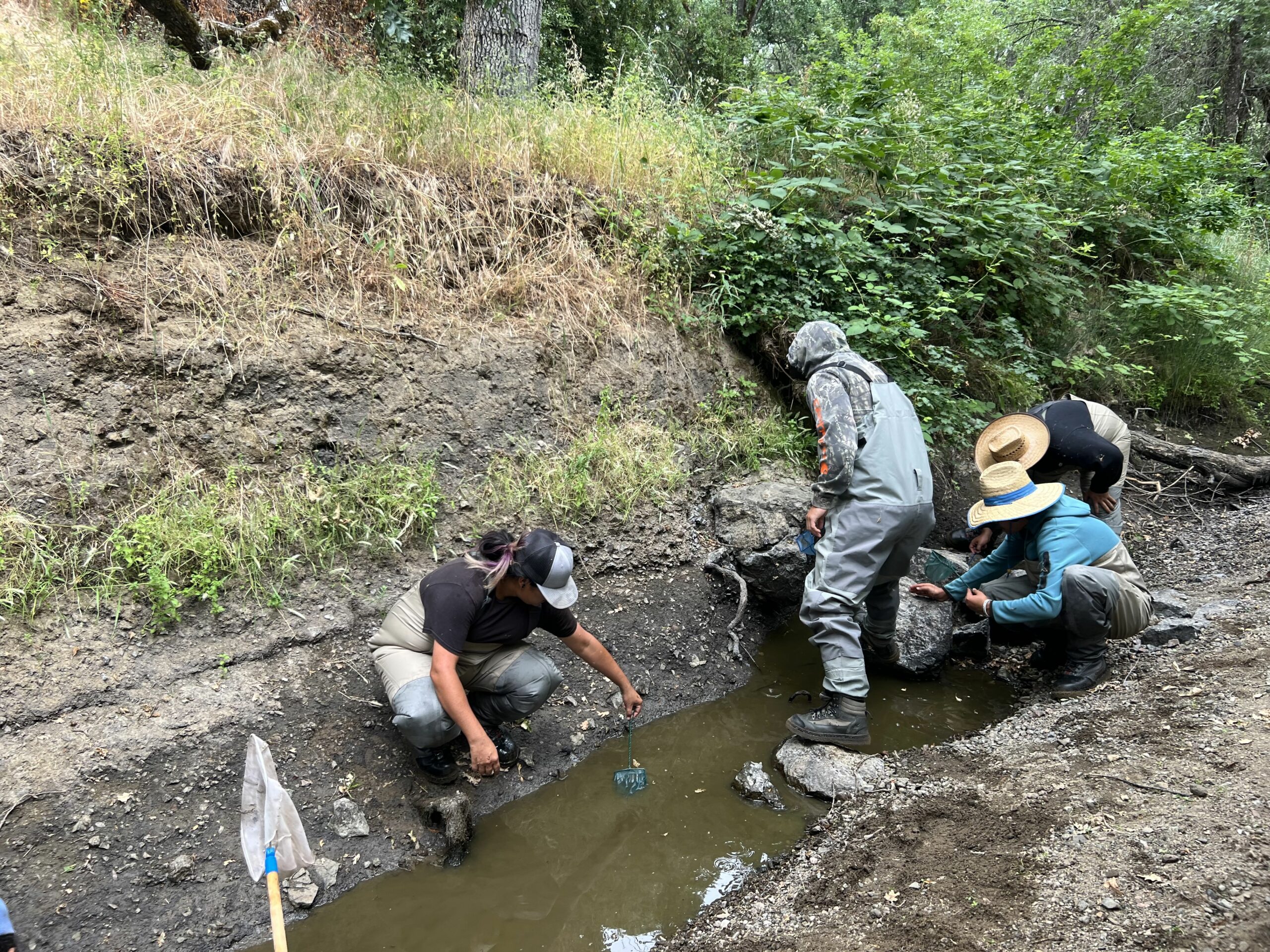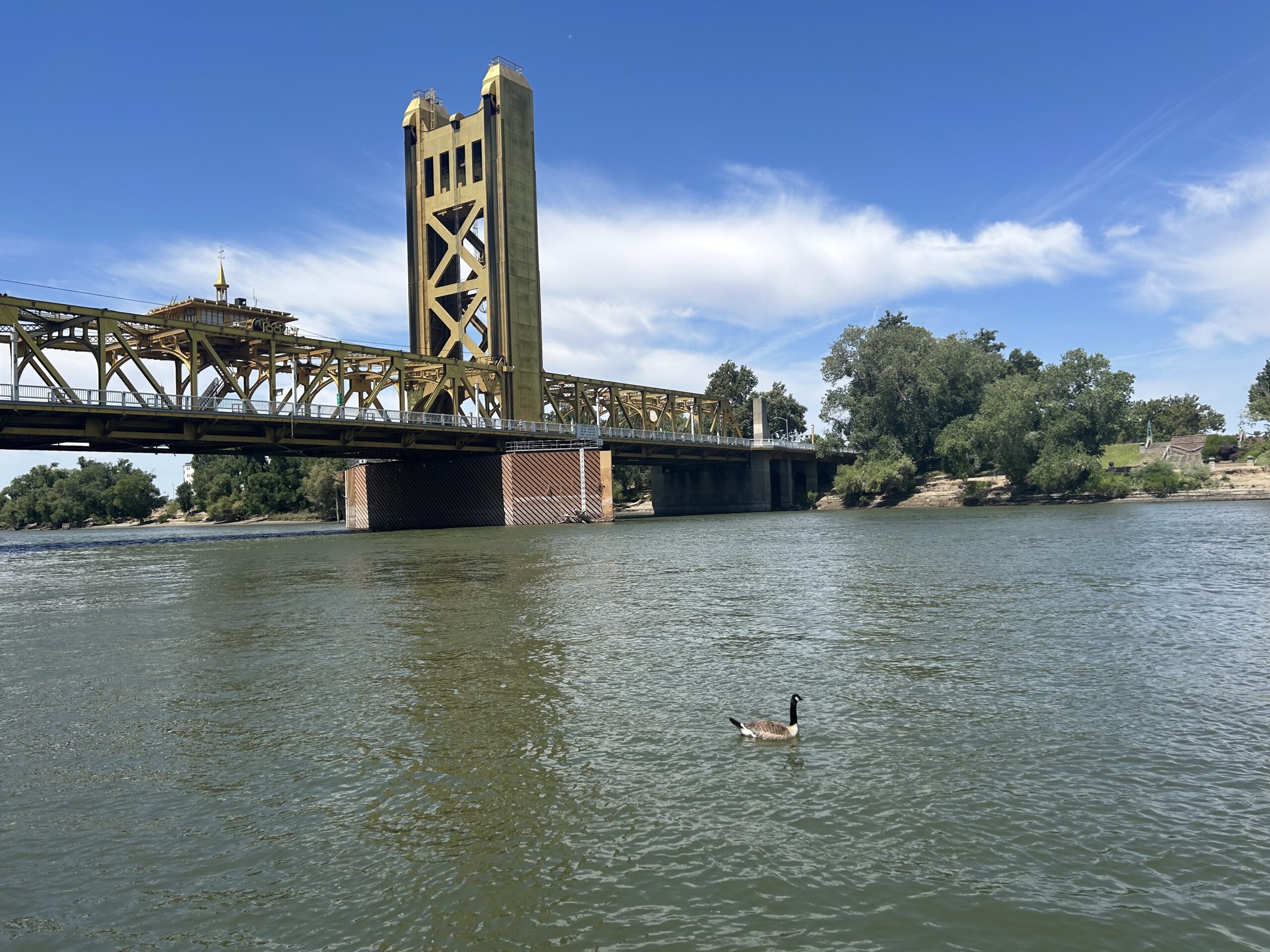Maia Pak is a 2023 JCal reporter from San Bernadino County.
A partnership between AAJA and / CalMatters

A partnership between AAJA and / CalMatters

JCal is a partnership between AAJA and CalMatters
2023 Program
Water and Drought
Considered threatened in California, the hitch remains unlisted at the federal level. Pomo Indians and advocates, meanwhile, are saving the fish with their own hands.
July 4, 2023

CLEAR LAKE, Calif. – Daniella Santana is making a life saving intervention.
Her goal — to save as many hitch fish as possible.
Battling the hot sun and pesky mosquitoes, the tribal member trudged down a muddy hill with plastic buckets, filling them up with water from Middle Creek and then pouring the liquid into large coolers she’ll drive 10 minutes away to rescue fish stranded in small puddles of water.
But these aren’t just any fish. They are Clear Lake hitch — small silvery minnows that only live in California’s largest natural freshwater lake, Clear Lake. The hitch spawn in nearby tributaries and creeks and if they can’t find their way back to the lake, they’ll die.
To some, the hitch is seen as trash — bait for fishermen to catch prized bass. In the past, Santana said some people have even driven over the creek bed, killing the hitch for sport. But for Pomo Indians, who have lived in Lake County for centuries, the hitch, also known as chi, is a way of life. They’re worried the hitch are in danger of going extinct.
“The Pomo tribes around here go back to like 11,000 years and the hitch was their main food source,” said Santana, environmental director for the Habematolel Pomo of Upper Lake. “There’s just a general lack of knowledge and lack of empathy for the natural resources around here.”
Competing with climate change and commercial interests has not only taken a toll on the hitch population, it has also weighed heavily on Native tribes. The disappearance of this species could take away yet another aspect of their culture.
“From Day One, even now, we still fight to preserve who we are amongst everything,” said Jesse Gonzalez, vice chair of the Scotts Valley Band of Pomo Indians.
His group is working with other tribes and the state, which designated the Clear Lake hitch as a threatened species. In addition to rescue efforts, the tribes and state are collecting data on the hitch population size, mating and reproduction.
“As long as there’s still some here and we get on the ball, we can save them, because they’re survivors,” Gonzalez said. “They’ve been here for thousands of years. They don’t want to die. They want to live.”
But it’s a race against time. Santana and volunteers of Robinson Rancheria Pomo Indians went on a recent summer weekday to Robinson Creek, where they poured the water from Middle Creek into small buckets to transport stranded hitch stuck in small puddles. Efforts were made to keep the temperature of the water cool and oxygenate the creek water in order for the hitch to have the highest chance of surviving the short car ride back to Middle Creek. Then, the group used small nets to scoop out the young hitch from the shallow puddles. Fully grown, the hitch may reach up to 14 inches in length. One was smaller than her pinky.
Recently, heavy rainfall has allowed for more water to flow to affected areas. However, the bounty of rain may end up stranding the fish into puddles as the rainy season ends.
“It gives the fish kind of a false sense of what is going on, so they weren’t able to get out in time,” Santana said. “So now with these disconnections, there’s still going to be a fish that we need to get out.”
But others like Robby Mason at Clear Lake Bait & Tackle say it’s not necessary. The store sells a popular fake hitch bait labeled “All American Trash Fish.”
“The fishing community thinks there’s plenty of hitch out there,” Mason said. “People have been calling me saying, ‘Hey, what’s all the fish run up these creeks?’”
Mason says there is no need for human intervention.
“It’s the oldest natural lake on the continent,” Mason said. “Let the lake do what it’s going to do. We can’t stop Mother Nature.”
The state is in the process of examining water usage including among businesses in Lake County, which it hopes will give more insight to how that affects the hitch. Lake County is home to a number of wineries and fishing events, which has helped boost the area’s tourism economy.
“Right now, we’ve been in data collection and analysis mode, really looking at those things and understanding the problems. We’re looking at putting quite a bit of resources into those types of data collection efforts,” said Jessica Bean, of the State Water Resources Control Board, in the Division of Water Rights Department.
However, any reallocation of water supply could potentially harm small businesses local to Lake County. Since some of these family-owned companies lack the budget and support of a large chain or corporation, small changes in their allotted water can have disproportionate effects.
“I think a lot of our laws are made from good intentions, without thinking about the reality of what could happen,” said Cynthia Olof, owner of Olof Cellars, a winery in Lakeport. “There really needs to be a balance in the laws, between the survival of businesses as well.”
Though currently listed as a threatened species by the state, the hitch remains unlisted at the federal level.
“The federal agency has repeatedly indicated that they were not willing to emergency list the fish, despite the significant declines,” said attorney Margaret Townsend, who has worked with the Pomo tribes to protect the hitch.”
The U.S. Fish and Wildlife said in May that while the hitch’s population in Clear Lake is “troubling,” there is no immediate solution to the issues affecting Clear Lake and its tributaries. The agency said it will continue its evaluation of the species, which is expected to be completed by January 2025.
“The service is committed to helping the Clear Lake hitch regardless of its federal listing status,” said Michael Fris, field supervisor of the Service’s Sacramento Fish and Wildlife Office in a May press release. “We will continue to monitor the species closely and work collaboratively with partners on projects that contribute to conserving the species.”
For now, Santana continues to do her weekly interventions to save stranded hitch before puddles dry up completely. That day, Santana and other volunteers saved 120 hitch.
After just four days, the puddles dried up.
Maia Pak is a 2023 JCal reporter from San Bernadino County.






JCal is a free program that immerses California high school students into the state’s news ecosystem. It is a collaboration between the Asian American Journalists Association and CalMatters.
Contact us at michael@calmatters.org or support@aaja.org.
Subscribe to aaja’s newsletter